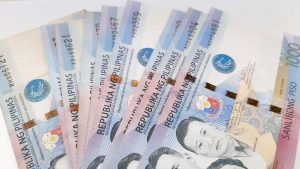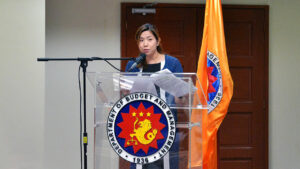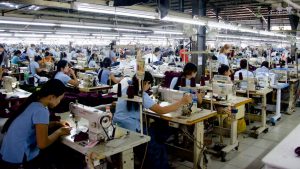THE NATIONAL Government’s (NG) budget deficit widened in May as spending growth outpaced revenues, the Bureau of the Treasury (BTr) said.
The NG’s budget gap ballooned by 43.1% to P174.9 billion in May from P122.2 billion in the same month a year ago.
Month on month, this was a reversal of the P42.728-billion surplus in April.
“The higher deficit resulted from an acceleration in government spending, pushing disbursement growth for the month to 22.24%, as against revenue expansion of 14.59%,” the BTr said.
In May, state expenditures jumped by 22.24% to P557 billion from P455.7 billion a year ago.
The BTr said this was due to the implementation of capital outlay projects of the departments of Public Works and Highways and National Defense and the social and health programs of the departments of Social Welfare and Development and Health.
“The higher National Tax Allotment shares of LGUs and increased budgetary support to GOCCs (government-owned and -controlled corporations) also contributed to the notable growth of disbursements in May,” it added.
Broken down, interest payments climbed by 47.78% year on year to P61.1 billion due to “additional debt incurred last year and higher interest rates of both domestic and foreign borrowings.”
Primary spending — which refers to total expenditures minus interest payments — rose by 19.69% year on year to P495.9 billion.
Meanwhile, revenues jumped by 14.59% to P382.1 billion in May from P333.4 billion in the same month in 2023.
“The robust outturn for the month was underpinned by higher nontax collections,” the BTr said.
Nontax revenues nearly doubled to P78.2 billion in May from P39.4 billion a year prior.
BTr income surged by 181% to P70.2 billion “due to higher collections from interest on advances from GOCCs, guarantee fees, and the NG share from Philippine Amusement and Gaming Corp. (PAGCOR) income.”
On the other hand, revenue from other offices declined by 44.38% to P8 billion in May.
“The collections from other offices (nontax) including privatization proceeds and fees and charges for May dropped by 44.38% due to the reclassification of accounts from the previous months’ transactions,” it added.
Meanwhile, tax revenues went up by 3.35% to P303.9 billion in May from P294 billion a year ago.
The Bureau of Internal Revenues (BIR) collections increased by 2.79% to P219.2 billion “due to higher tax collections on value-added tax (VAT), taxes on net income and profit (withholding at source and on wages of personal income tax), and miscellaneous tax,” the BTr said.
The Bureau of Customs (BoC) revenues rose by 4.33% to P81.3 billion, amid “improved revenue collection performance (due to) the continued monitoring of the values and classifications of imported commodities, as well as intensified border control and improved trade facilitation.”
FIVE-MONTH DEFICITMeanwhile, the budget deficit in the January-May period widened by 24.06% to P404.8 billion from P326.3 billion a year ago.
Government spending rose by 17.65% to P2.26 trillion as of end-May from P1.92 trillion in the same period a year ago.
Interest payments surged by 40.08% to P321.6 billion while primary spending went up by 14.6% to P1.94 trillion.
Meanwhile, five-month revenues stood at P1.85 trillion, up by 16.34% from P1.59 trillion a year earlier.
Tax revenues increased by 11.18% to P1.59 trillion as BIR revenues rose by 12.81% to P1.19 trillion while BoC collections went up by 6.01% to P380.9 billion.
Nontax revenues jumped by 60.58% to P267 billion as BTr income rose by 151.09% to P206.5 billion.
Rizal Commercial Banking Corp. Chief Economist Michael L. Ricafort said in a Viber message that the wider budget deficit may be due to higher inflation that bloated government expenditures.
Inflation picked up to a six-month high of 3.9% in May from 3.8% in April. This brought average inflation to 3.5% in the January-May period.
“Wider deficits would increase the urgency for tax reform measures and other fiscal reform measures, at least intensified tax collections from existing tax laws, among others,” he said.
“At some point, if inflation stabilizes further, there could be some need for higher taxes and new taxes, as a final option,” he added. — Luisa Maria Jacinta C. Jocson





